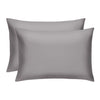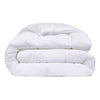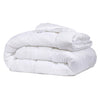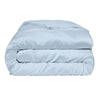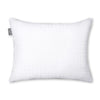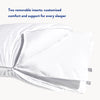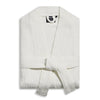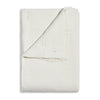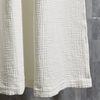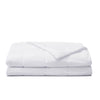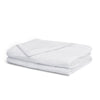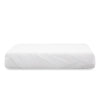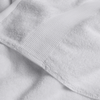The Daily Miracle
What Are The Best Bed Sheets For Allergies?
Published
May 01, 2025
Author
John Tsenekos

Finding the right bedding can be a real challenge for allergy sufferers. Traditional sheets often harbor dust mites, mold, and other allergens, turning your bed into a nightly battleground. Waking up with itchy eyes and a stuffy nose is no way to start the day. That's why selecting bed sheets that minimize allergens is so crucial.
Hypoallergenic sheets, like those made from bamboo, Tencel, or silver-infused fabrics, can truly transform your sleep experience. These materials are soft and breathable, offering natural resistance to allergens and ensuring a cleaner, more comfortable night's rest.
Hypoallergenic Bedsheets: Best For Allergies
Traditional bedding can be a sneaky source of allergens, especially for those with sensitivities. Dust mites love cozy, humid spots like your bed, where they feast on dead skin cells, causing sneezing, runny noses, and even asthma attacks. Mold is another culprit, thriving in damp or poorly ventilated areas, and it can make breathing problems and allergy symptoms worse. For anyone dealing with allergies, these hidden allergens can lead to serious health issues, like long-term respiratory problems and skin irritation.
This is where hypoallergenic sheets come in. These sheets are made from bamboo, Tencel, or silver-infused fabrics that naturally resist dust mites and mold. These materials also let air flow and keep moisture away, making your bed cleaner and healthier. For people with persistent allergies, hypoallergenic bedsheets are a lifesaver!
The Best Bed Sheets for Allergies
Finding the right bed sheets for allergies can really change how well you sleep.
Organic Cotton Sheets
Organic cotton sheets are a fantastic choice if you're looking to keep allergies at bay. They're made without any harsh chemicals or synthetic pesticides, which means they're gentle on your skin and less likely to cause irritation. The tightly woven fibers act like a natural shield against dust mites and other pesky allergens, helping you sleep more peacefully.
What's great about organic cotton is how breathable it is. These sheets let air flow freely, keeping your bed cool and dry. This is super important because dust mites and mold love damp, warm places.
Bamboo Sheets
Bamboo sheets are a top pick for anyone dealing with allergies. The fibers naturally fend off dust mites and mold, making your bed a cleaner, safer place to rest. Plus, bamboo is known for being incredibly breathable and moisture-wicking, which helps keep humidity levels down and allergens away.
Another perk of bamboo sheets is their silky smooth texture. They're gentle on the skin, reducing friction and irritation, which is perfect if you have sensitive skin. And let's not forget, bamboo is a super sustainable resource, growing quickly and using fewer resources than other materials.
Tencel Sheets
Tencel sheets, made from eucalyptus wood, are a dream for allergy sufferers. They're produced in an eco-friendly way that naturally keeps allergens at bay. These sheets are incredibly breathable and great at wicking away moisture, which means your bed stays dry and less inviting to dust mites and mold.
The smooth, silky feel of Tencel is a treat for your skin, especially if you're prone to allergies or sensitivity. They're also durable and keep their softness wash after wash, giving you long-lasting comfort.
Silver-Infused Sheets
Silver-infused sheets bring something special to the table with their antibacterial properties. The silver in the fabric helps cut down on bacteria and microbes, keeping your sheets fresher for longer. This means fewer allergens like dust mites and mold, which is a win for all but especially for people with allergies.
Besides their antibacterial magic, these sheets are breathable and moisture-wicking, making your bed a comfy and clean haven. The silver adds an extra layer of protection, ensuring you have a healthier sleep environment. It's a smart choice for those who want both comfort and cleanliness in their bedding.
Things To Look For in Hypoallergenic Bedsheets
Choosing the right hypoallergenic bed sheets can make a big difference in your sleep quality and health. Here’s what to look for to ensure your bedding keeps allergens at bay and provides a comfortable night's rest.
Material or Fabric
When choosing bed sheets for allergies, the material is crucial. Opt for natural fibers like bamboo, Tencel, organic cotton, or silver-infused fabrics is the way to go. These materials are naturally hypoallergenic, meaning they resist dust mites and mold. Bamboo and Tencel are also known for their breathability and moisture-wicking properties, which help keep your bed dry and less hospitable to allergens.
Thread Count
Thread count refers to the number of threads woven into a square inch of fabric. A higher thread count often means a tighter weave, which can prevent dust mites from penetrating the fabric. Look for sheets with a thread count of at least 300 for a balance of softness and allergen resistance.
Organic vs. Non-Organic
Organic bedding is made without harmful chemicals or pesticides, which can be beneficial for those with allergies. Organic cotton, for example, is grown without synthetic fertilizers or pesticides, reducing the risk of skin irritation and allergic reactions.
Breathability
Breathability is key in hypoallergenic sheets. Fabrics that allow air to circulate help regulate temperature and wick away moisture, creating an environment that is less conducive to dust mites and mold growth. This is particularly important for those who experience night sweats or live in humid climates.
Simple Ways to Keep Your Bedroom Allergen-Free
Transforming your bedroom into an allergen-free zone is easier than you might think.
Kick Dust Mites Out
Dust mites love to hang out in your bed, but you can show them the door with a few easy steps. Wash your sheets, pillowcases, and blankets at least once a week in hot water—130°F (54°C) is ideal—to kill any mites that might be lingering. Also, opt for hypoallergenic comforters for added protection against common allergens.
Vacuum and Dust Regularly
Keeping your bedroom clean is key to reducing allergens. Vacuum your floors and carpets at least once a week using a vacuum with a HEPA filter to trap dust and allergens. Don't forget to dust surfaces like shelves and nightstands regularly. Use a damp cloth to prevent dust from becoming airborne and settling back down.
Choose the Right Window Treatments
Heavy drapes can trap dust and allergens, so opt for light and breezy window treatments that are easy to wash. Blinds or shades are great alternatives because they can be wiped down regularly. Keeping your windows closed during high pollen seasons can also help keep allergens out.
Declutter Your Space
A clutter-free bedroom is an allergen-free bedroom. Keep surfaces clear and store items in closed containers to prevent dust accumulation. This not only makes cleaning easier but also reduces the number of places allergens can hide.
Protect Your Air
Using an air purifier with a HEPA filter can significantly improve the air quality in your bedroom by capturing airborne allergens like dust, pollen, and pet dander. Additionally, a dehumidifier can help keep humidity levels low, making it harder for mold and dust mites to thrive. Aim to keep your room's humidity between 30-50% for the best results.
Keep Pets Out
As much as we love our furry friends, they can bring allergens into the bedroom. If possible, keep pets out of your sleeping area to reduce exposure to pet dander. If that's not an option, make sure to wash your pet's bedding regularly and groom them often to minimize shedding.
Conclusion
Opting for high-quality, allergy-reducing bed sheets is a wise choice if you're dealing with allergies. Sheets crafted from materials like organic cotton, bamboo, Tencel, and silver-infused fabrics naturally combat dust mites and mold, providing you with a cleaner, healthier sleep environment.
Why not give Miracle Made® Sheets a try? Their innovative silver-infused technology offers you an extra layer of protection, helping to keep allergens at bay and ensuring you enjoy a fresher, more comfortable night's sleep.
Sources:


